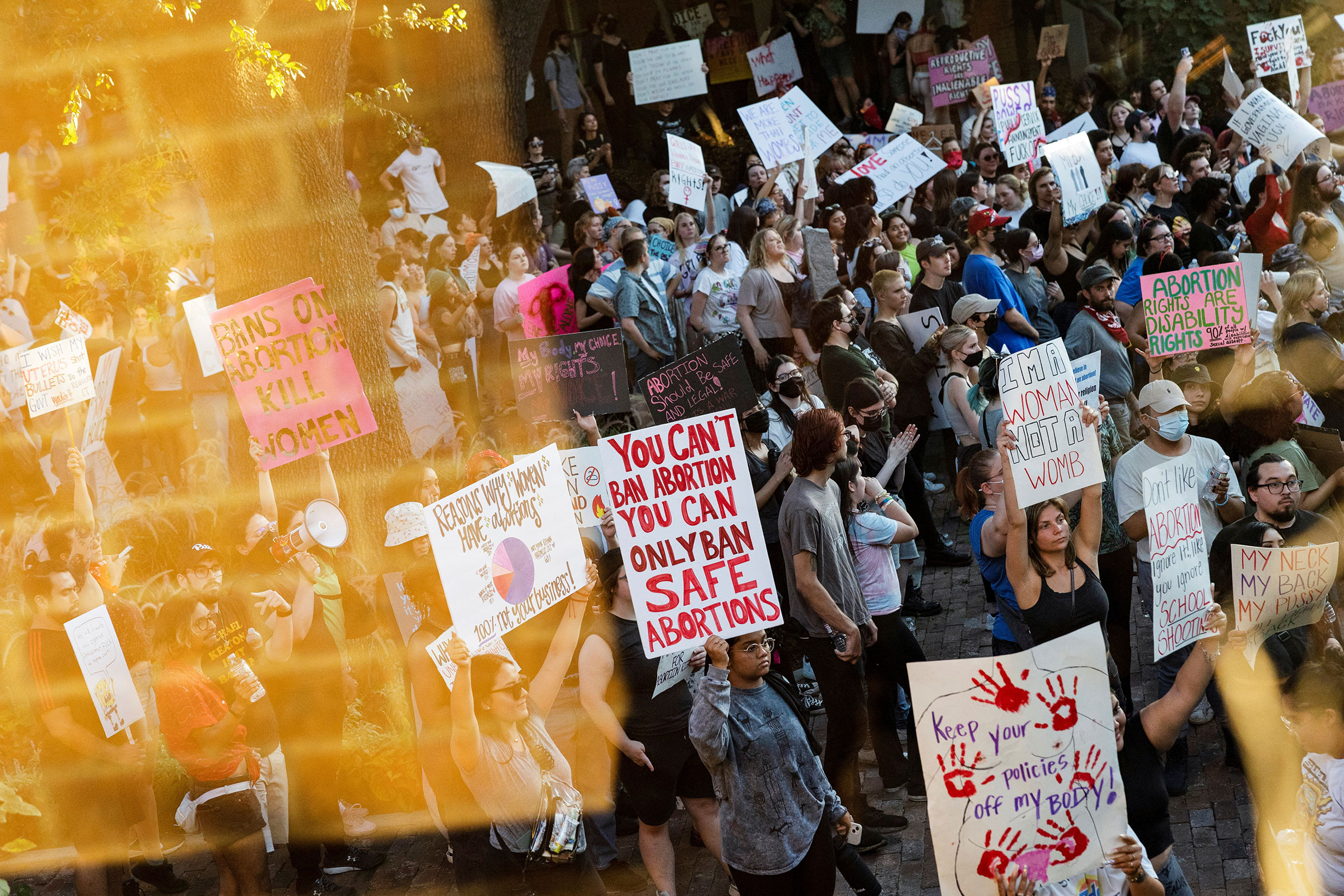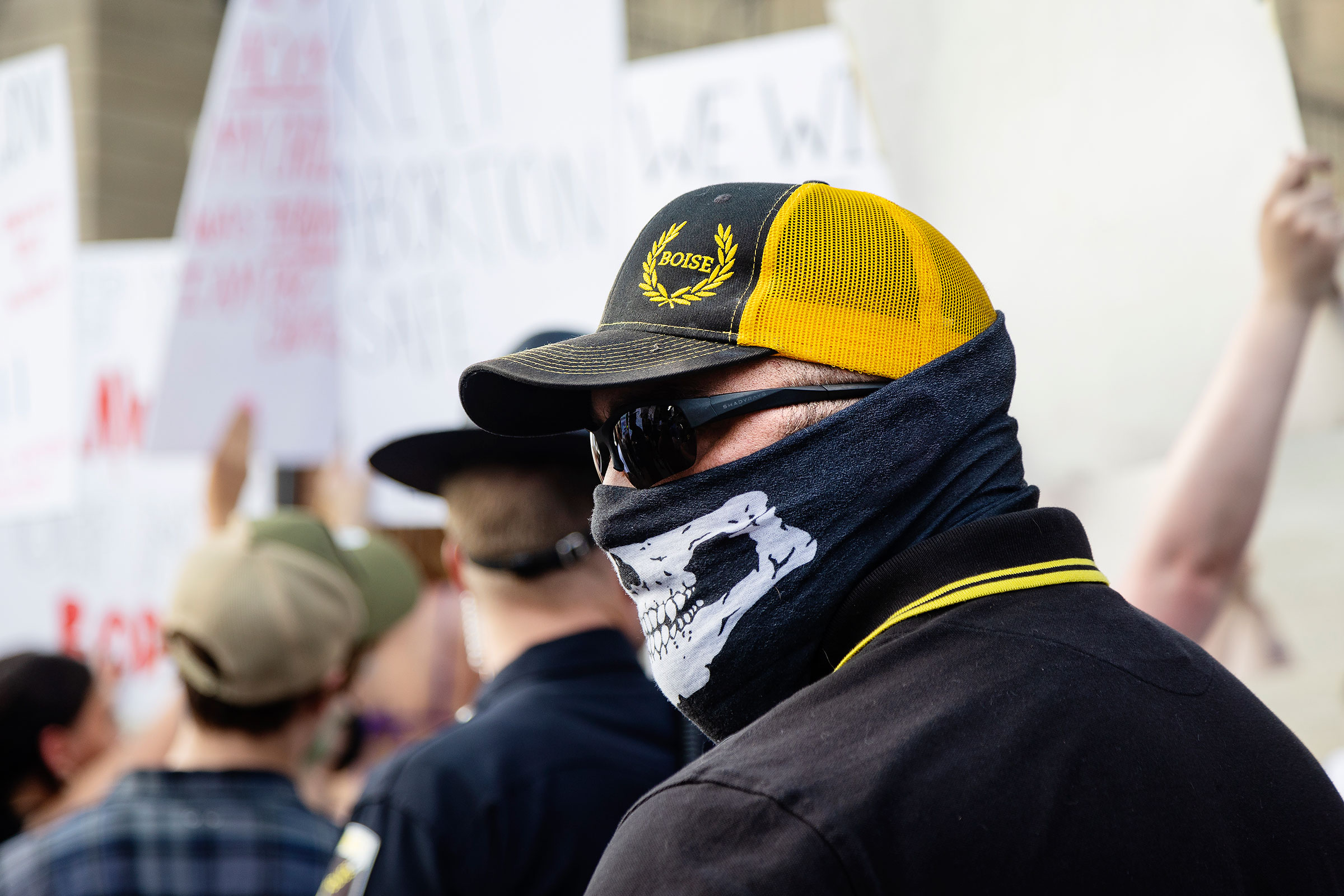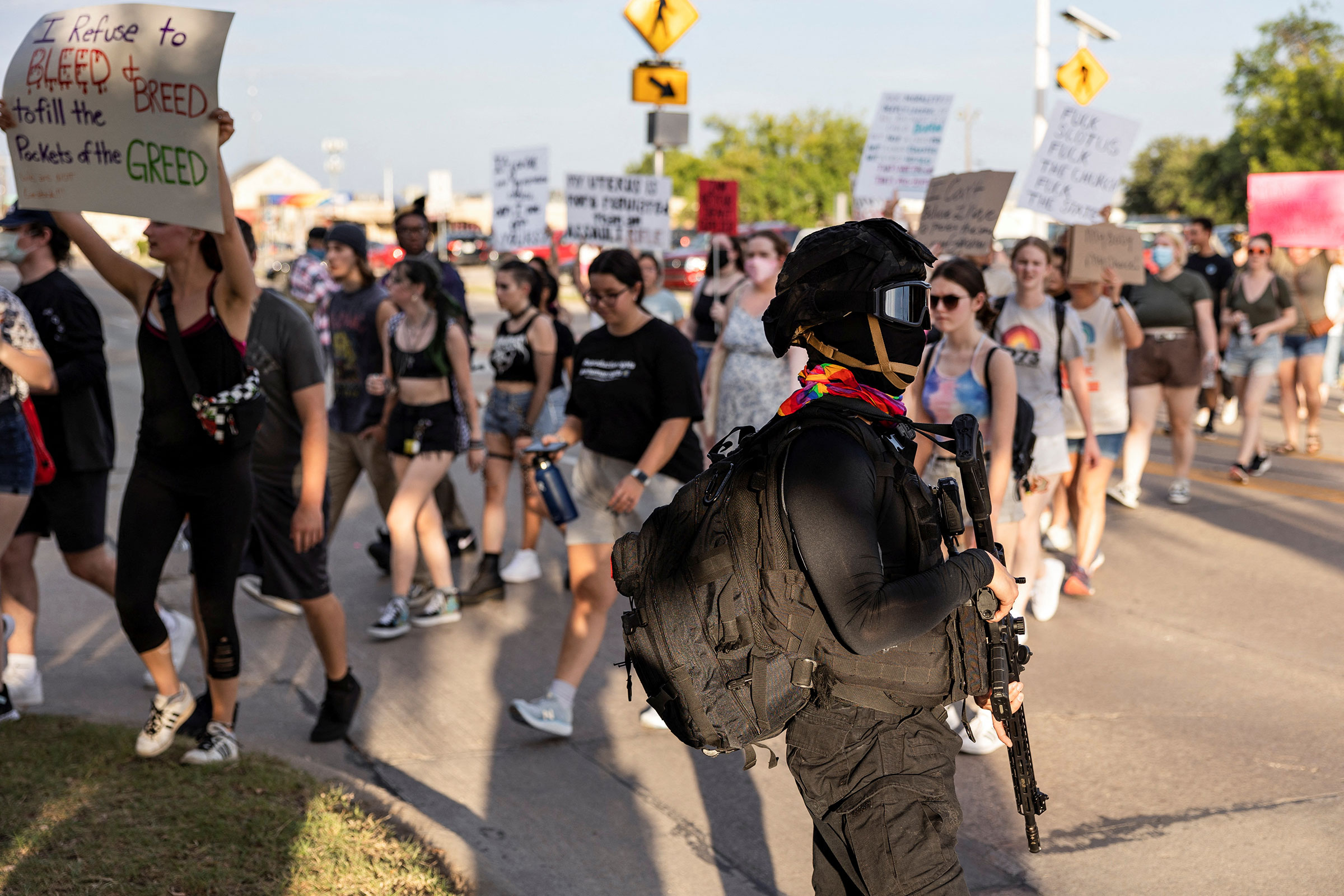
Armed demonstrators and extremist groups have increasingly gathered at abortion-related protests in the aftermath of the Supreme Court’s overturning of Roe v. Wade, causing analysts to warn of a rising threat of violence.
Eight abortion-related demonstrations featured armed individuals in the week after the June 24 ruling, bringing the total number of such protests in 2022 to 10—nearly twice as many as in all of 2021, according to a new analysis shared with TIME by the Armed Conflict Location & Event Data Project (ACLED), a nonprofit that tracks political violence and demonstrations.
Anti-government militias and extremist groups like the Proud Boys have appeared at 27 abortion-related events as of July 1, according to ACLED’s data, a 160% spike over the previous year. In 2020, far-right groups appeared at only 1% of demonstrations related to abortion rights; so far this year, almost one in five events involved members of a far-right group.
As armed demonstrators and far-right groups flock to abortion-related protests, abortion-rights activists have begun bringing guns themselves, according to ACLED, including at a rally in Dallas on July 2. The combination of the presence of firearms and competing demonstrators has alarmed analysts. Roughly half of the abortion-related demonstrations that have turned violent or destructive have involved counter-protestors. “It’s all the makings of a really worrying trend,” says Roudabeh Kishi, the director of research and innovation at ACLED.
Abortion-related demonstrations that involve people with firearms are more likely to turn violent. So far this year, 33% of them have, according to ACLED’s data, compared to 0.2% of those that don’t involve guns. None of that violence has included shootings. But tensions are rising, giving domestic extremists an opportunity to exploit these protests to incite violence among their supporters, national security officials say.

Outside the Idaho state capitol on June 28, fighting broke out between an anti-abortion prayer rally of 200 people—which included a number of Proud Boys armed with assault rifles—and protestors demonstrating against the Supreme Court decision. A few days earlier, on the evening of the ruling, a self-identified member of the Three Percenters militia armed with an AR-15 started recording a group of protestors outside a crisis pregnancy center in Eugene, Ore. The protest was dispersed after police fired tear gas, leading to the arrest of 10 people.
Read More: Anti-Abortion Pregnancy Centers Are Collecting Troves of Data That Could Be Weaponized Against Women.
The Department of Homeland Security has highlighted the potential for violence by domestic extremists in the wake of the Supreme Court decision. Viral posts on online forums warned that the far-left abortion-rights group “Jane’s Revenge,” which DHS calls “a network of loosely affiliated suspected violent extremists” linked to arsons at crisis pregnancy centers, had shared a blog post encouraging a “Night of Rage” after the abortion ruling was issued. In response, far-right extremists called for “attacks against abortion-related targets,” according to a DHS intelligence memo disseminated to federal, state, and local law enforcement officials, first responders and their private sector partners.
While widespread violence failed to materialize, the dueling militant rallying cries highlighted the increasingly chaotic environment, in which both real and perceived threats are blending with disinformation, leading to a feedback loop that can be as dangerous as the threats themselves, security officials and analysts say.
“People are taking threats from more obscure, fringe groups and spreading them widely online: ‘Oh, look, here’s what they want to do to us,’” says Sivanne Shalev, the head of emerging trends and misinformation at ActiveFence, a technology security company that analyzes disinformation and hate speech. “Amplifying threats and misinformation [causes] a lot of confusion which in itself can be dangerous and can promote real world harm.”
Abortion-rights activists say the uptick in violent threats and attacks they’ve seen in recent years is tied to the larger rise in hate speech and political violence. Many of the same groups involved in the white-nationalist rally in Charlottesville in 2017 and the attack on the U.S. Capitol on Jan. 6, 2021 events are now threatening abortion providers, says Melissa Fowler, chief program officer at the National Abortion Federation (NAF).
“For abortion providers, watching January 6 was really very familiar,” says Fowler. “People with militia gear, with weapons, the rhetoric like calling for people to be hung and to be harmed…those are all things that that these extremists do outside of clinics and have been using to torment providers for years.”

Violence against abortion providers rose significantly in 2021, according to a report last month from NAF, which has been tracking this data for 45 years. Assaults of abortion-clinic employees and patients increased 128% year-over-year, while stalking leaped 600% and bomb threats jumped 80%.
When Texas passed a law last year significantly restricting access to abortion, there was an escalation of violent and aggressive activity there and in surrounding states where women sought care, Fowler says, such as harassment, intimidation, forcibly entering abortion clinics, and death threats. Abortion-rights activists fear a similar surge with even greater intensity in the aftermath of the Dobbs ruling. “A political victory like this can really embolden people who want to harass and terrorize abortion providers,” Fowler says.
Read more: Inside the Biden Administration’s Uphill Battle Against Far-Right Extremism.
In the days since the ruling, posts in extremist online spaces have lauded violent anti-abortion activists like Robert Lewis Dear, who killed three people and wounded nine others in 2015 in a mass shooting at a Colorado Planned Parenthood clinic. One poster, citing Dear, wrote, “If you’re ‘pro-life’ but aren’t prepared to follow in their footsteps…you’re wasting your time,” according to the internal DHS memo, first reported by Axios.
The memo warns that federal judges, state lawmakers, abortion clinics and abortion rights protests, as well as faith-based anti-abortion centers, could all be targeted. “Some racially or ethnically motivated violent extremists’ embrace of pro-life narratives may be linked to the perception of wanting to ‘save white children’ and ‘fight white genocide,'” it says. “Violence could occur for weeks… particularly as [domestic extremists] may be mobilized to respond to changes in state laws and ballot measures on abortion stemming from the decision.”
At the same time, the FBI is investigating a spate of threats and arson targeting anti-abortion pregnancy centers that began in the weeks after the leak of the Supreme Court draft opinion indicating that Roe would be overturned. The June 24 DHS memo also cites at least 11 incidents of vandalism “threatening violence targeting religious facilities perceived as being opposed to abortion.”
Anti-abortion groups say they’ve stepped up security amid rising tensions. Students for Life, a national anti-abortion organization, has been adding safety trainings for its staff as well as “more and more paid security,” spokesperson Kristi Hamrick says. Heartbeat International, a national organization that runs more than 2,500 anti-abortion centers, told TIME the week before the ruling that “the primary concern we have from affiliates is regarding their centers’ security and protection given the increase of attacks directed at pro-life organizations.”
With abortion-related protests set to continue in the months leading up to the midterm elections, federal law-enforcement officials acknowledge they’ll have to walk the line between monitoring these often amorphous threats and protecting peaceful protests. As DHS itself notes itself in its memo, “strong rhetoric, or generalized philosophic embrace of violent tactics does not constitute domestic violent extremism or illegal activity and is constitutionally protected.”
With reporting by Abigail Abrams/Washington
More Must-Reads From TIME
- Dua Lipa Manifested All of This
- Exclusive: Google Workers Revolt Over $1.2 Billion Contract With Israel
- Stop Looking for Your Forever Home
- The Sympathizer Counters 50 Years of Hollywood Vietnam War Narratives
- The Bliss of Seeing the Eclipse From Cleveland
- Hormonal Birth Control Doesn’t Deserve Its Bad Reputation
- The Best TV Shows to Watch on Peacock
- Want Weekly Recs on What to Watch, Read, and More? Sign Up for Worth Your Time
Write to Vera Bergengruen at vera.bergengruen@time.com